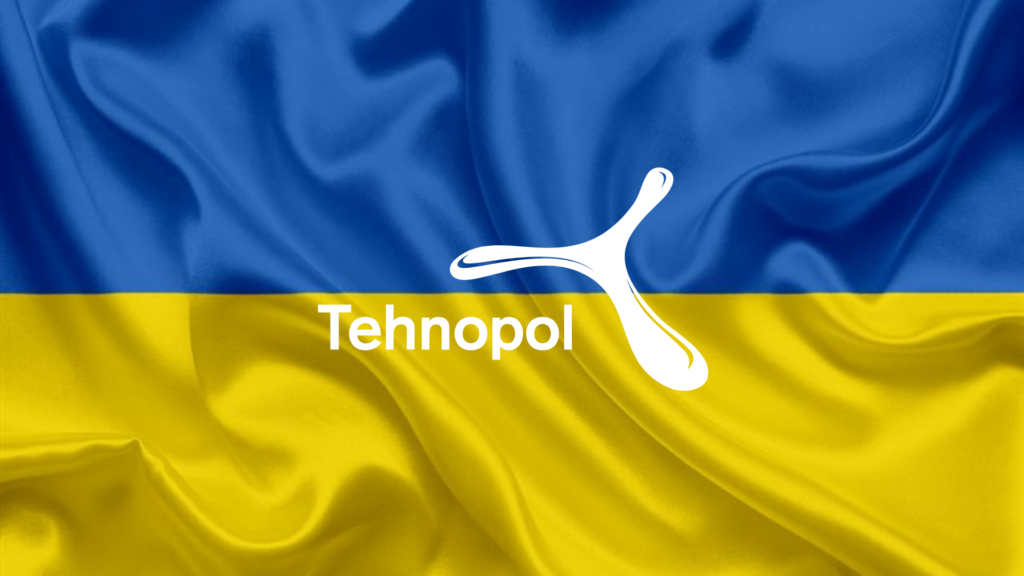02.03.2022
Tehnopol encourages everyone to contribute to Ukraine and to be careful of the accuracy of information concerning the unfolding events

There is evidently no need to give any introduction to what is currently happening in Ukraine. We are using the Tehnopol channels to give information on how to help Ukraine and on how to navigate the flood of information. We have brought together the main organisations and causes that you can support, and we are underlining how important it is under the current circumstances to pay close attention to the sources of the news you read.
How to support Ukraine and the Ukrainians?
The key information has been brought together on the website ukrainaheaks.ee/en, which was created in 2014 by three non-profit organisations (MTÜ Eesti Pagulasabi, MTÜ Mondo and MTÜ Ukraina Kultuurikeskus). The account numbers and donation hotline telephone numbers of those organisations can be found on the website. The Facebook page (they post in Estonian and English) of the non-profit organisations that set up the Ukraina heaks site give further useful information on how to help.
The Estonian Red Cross also gives information for those wishing to help, and has various ways to do so on its website (in Estonian only). ERR, the national broadcaster, also lists organisations offering aid, and that can be found here.
Foreign organisations that can be trusted include United Help Ukraine, which focuses on helping refugees, and providing medical goods and food aid. The latest information can be found on their Facebook page.
How to know whether information is accurate?
The most reliable sources in Estonia are the main media channels like ERR, Postimees (also available in Russian), Eesti Ekspress (in Estonian only), Eesti Päevaleht (in Estonian only), Delfi (available in Estonian and Russian), Õhtuleht (in Estonian only), and Äripäev (in Estonian only). Estonian television gives a more comprehensive picture, and has put on several special programmes to give useful information for those looking to help. In social media it is even more important than ever before to step back and take a very critical view of what you read and see there.
For English speakers we also recommend Estonian World, a global independent online magazine, founded in London in 2012. The magazine has editorial representations in London, Boston, Los Angeles and Tallinn, and contributors all over the world. In addition to live updates about current situations they have also put together an extended list of NGOs to support.
Researchers of the University of Tartu Institute of Social Sciences have also compiled a list of information channels that provide reliable and up-to-date information during the war. You can find the list here.
The social scientist, social media researcher and lecturer at the University of Tartu Maria Murumaa-Mengel* has helped put together a list of the key recommendations for handling information:
- Report hostile or irrational fake information and block the source.
- Share and support reliable voices.
- Criticise false information using a screenshot and not a link.
- Share the original post rather than just copying the content, as this will give faster access to the source.
- Don’t troll. Avoid sarcasm when communicating online.
- Don’t let online trolls upset you or provoke you.
- Learn how to check the background and origin of photographs and videos, starting by using Google Image Search for example.
- Follow and trust experts and professional journalists.
- Do not share information that could put people caught up in battle in danger.
- Take a break from the flood of information!
- Support and value a free press.
- Develop your own media and information skills.
- Be forgiving and share what you know, as false information is often shared unintentionally.
*This list was put together by Maria Murumaa-Mengel, Diana Poudel, Piret Rospu, Pille Runnel, Simmo Saar and Tuuli Velling.
You must be even more careful when reading foreign news channels, as the power standing behind apparently reliable sources may have a greater or lesser degree of bias.
There is also a list of the main false narratives that volunteers from the Defence League have copied across from Propastop so that they can be recognised more quickly.
Do not forget to share relevant information with children! They can be very sensitive to anxiety and fear around themselves. They are different from adults in that they can have a very active imagination that can take them into quite a different world without an adult’s word to guide them. Recommendations from child psychologist Anne Kleinberg on how to talk to children can be found here.
To keep a grip on your mental health though, it is important to take a break from the flood of information. It is even better if you set aside a fixed time each day to read information from reliable channels and at other times switch off notifications for news sources completely.












